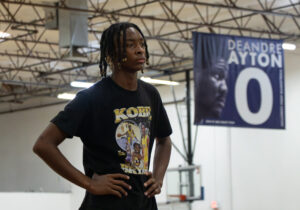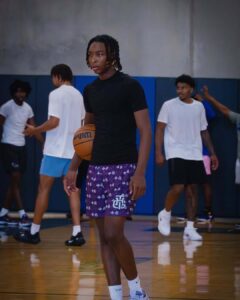- Slug: Sports–Middle School Recruiting, 1,500 words.
- Photo available.
By Dylan Ackermann
Cronkite News
MESA – While most middle schoolers were focused on back-to-school shopping, Kyi Kyi Miles was heading to a workout with his trainer and former Arizona State University guard Jahii Carson.
On the way to the summer workout, while Miles sat in the passenger seat, his father, Jarvis, mentioned that he received a phone call and that the caller wanted to follow up.
Not expecting it to happen so soon – he thought junior year would be the time – Miles was caught off guard when, after putting the call on speaker, he received his first verbal offer from University of San Francisco men’s basketball coach Michael Plank.
At the time, Miles hadn’t yet started his eighth-grade year at AZ Compass Prep, but according to Plank, he was still one of the best players at the Dons’ basketball camp.
“It’s the landscape of recruiting right now,” Perry boys basketball coach Sam Duane Jr. said. “Schools probably need to get in early now. Colleges feel that any edge they can get matters, and if they can be the first to offer and let the player know, ‘Hey, I’ve been here from the start,’ it makes a difference.
“I think now, more than ever, it’s part of the process with five-star recruits and elite players.”
Despite being only 15 years old, Miles, who is now a freshman guard at Mesa High, already has scholarship offers from Arizona State, Grand Canyon, Texas Tech, and three other programs, according to trainer Ethan Telfair.
It’s only a matter of time, Telfair says, before coaches from across the country start knocking on doors as “early as fifth grade.”
Kids like 6-foot-10 Sunnyslope sophomore center Darius Wabbington, who received offers from Cal State Northridge and Arizona State before stepping on a high school court, are becoming more common. His classmate and point guard, Delton Prescott, did the same, earning offers from Portland, Fresno State, McNeese State, Bryant and ASU before playing a high school game.
The support for early recruiting is mixed. Why would a coach invest time in a player who can’t sign a national letter of intent until their senior year?
Still, Duane, Telfair, Sunnyslope coach Ray Portela and Mesa coach Scott Stansberry all agree that perspectives are shifting, though in different ways.
“I think a lot of these schools nowadays want to get the jump ahead of each other,” said Portela, who has been coaching at Sunnyslope since 2010. “They’re offering earlier and earlier, trying to develop an early relationship with these players. It’s advantageous for schools. Plus, with social media, schools want their brand out there. So, if they offer a kid, they know or will want the kid to splash it all over social media.
“In a way, it’s cheap advertising, and at the same time they’re hoping to maybe get a great player out of it.”
Duane Jr. has been at Perry since 2016 following a triumphant 12-year stint as head coach at his alma mater, Corona del Sol, where he won four consecutive state championships. He can’t help but laugh when talking about how blessed he’s been with the players he’s coached.
Among them are Washington Wizards center Marvin Bagley III, Oklahoma City Thunder forward Jalen Williams, his brother, Utah Jazz forward Cody Williams and former Phoenix Suns guard Saben Lee. Now, at Perry, he is coaching five-star recruit senior forward Koa Peat, who just narrowed his list of colleges to five, including Arizona and ASU.
Four of the five schools in Peat’s Top 5 – excluding Texas – have been recruiting him since ninth grade.
Leery of late interest from schools, Duane Jr. questions why a program is suddenly pursuing a top recruit.
“The more they can get to know these coaches, the better,” Duane Jr. said. “I always tell our guys, do your due diligence, build a relationship with the staff and go where you’re loved because when you hit tough times, which every player will do when they hit college, it’s just a different level. You want to be where you’re really loved.”
However, even after coaching a player like Bagley III, who received his first offer at 14 years old from Northern Arizona University, Duane Jr. admits he still hasn’t found the perfect recipe to help some players stay grounded.
Now, with social media, early recruiting has become even more complex.
“The social media aspect of it has taken it to a whole different level,” said Stansberry, who has been coaching at Mesa for 11 years. “Everything’s just out there and you can just see it at the click of a button instantaneously. I’m sure colleges are competing and wanting to be the first, not even necessarily to just offer, but to show their brand.”
Duane Jr. added, “Some of the kids that get early offers might be offers that later on down the road aren’t there. Kids need to be careful with that. Sometimes an offer goes out early as a favor and a lot of times those offers aren’t sustained over those four years. I think kids, it would be better if the offers were later, but that’s not going to change.”
Watching his brother, former Phoenix Suns guard Sebastian Telfair, grow up playing basketball in Coney Island, New York, Ethan Telfair believes that despite the complexities, social media has changed the recruiting landscape for the better.
Before entering the 2004 NBA Draft straight out of high school, Sebastian, considered a high school phenomenon, even had a documentary, Through the Fire, made in 2005 that followed his senior year at Abraham Lincoln High School.
Though Sebastian was unable to monetize the film or his status during that time, Ethan is thankful that he can now help Miles do just that – though Ethan doesn’t receive a dime in return.
“Back then it was closed off to communities,” Telfair said about NIL opportunities. “The big corporations benefited from athletes, but the athletes got nothing in return. I like that now they give these players the opportunity to take care of themselves and family earlier than before using the game of basketball because you never know when the game can be taken from you.
“These athletes have forever been walking billboards.”
More often than not, young recruits receive early offers and NIL deals, but they either don’t pan out, lose their motivation or lose their offers.
Amid all the opportunities, including Miles’ main NIL deal with Coco 5, an all-natural coconut water-based sports drink founded by Devin Booker, the reason Telfair works with Miles is simple: despite everything, NIL isn’t the priority.
“He already treats himself and carries himself like he’s where he wants to be,” Telfair said. “I tell him ‘Let’s not worry about rankings, let’s not worry about endorsements and let’s not worry about NIL reports.’ I don’t know why I even remind him of it because all he cares about is coming to the gym every day to put in work. He already has a professional mentality.”
Miles added, “I just honestly just don’t let it get to me. I just don’t even think about it. I just remember who I am and don’t let the offers make me feel bigger than what I actually am.”
The same holds true for Wabbington and Prescott.
“The early scholarships are good, it gets my name out there more,” Wabbington said. “But, at the end of the day, does it matter? All that matters is what I can do on the court ‘cause highlights can make anybody look good.”
Prescott added, “It’s not really the most important thing for me for those highlights. I do really appreciate them for doing that for me. Rankings, too, don’t really mean anything to me. It’s motivation for me to dominate those guys above me.”
This is due, in part, to the guidance of Portela, Duane Jr., Stansberry and Telfair.
Ultimately, it’s up to the coaches to inform the young recruits, and for the parents to learn more about the recruiting process.
Whether it’s Sunnyslope opening its gym to college coaches, Telfair providing resources and staying in close contact with Jarvis, Mesa probing players’ true ambitions, or Perry reinforcing Sunnyslope’s mantra that “winning solves all,” each plays a crucial role.
And it’s just the beginning for navigating early recruiting as it continues to evolve.
“The better the team does, the better your individual goals or the better recognition you will receive,” Portela said. “You may be nice and dandy, but when we get to the season, you need to play for the brother beside you, not just for yourself. That’s what gets you noticed.”
In the complex world of recruiting, the main ingredient is simple.
“Everything comes from winning,” Duane Jr. said. “Schools want to recruit players from winning programs who know how to win. If you’re in a winning program and the team is winning, that usually means you’re playing with other good players. With that, if you develop the mindset of being able to play around other good players and win, usually recruiting and the future takes care of itself no matter what the recruiting landscape looks like.”
For more stories from Cronkite News, visit cronkitenews.azpbs.org.


